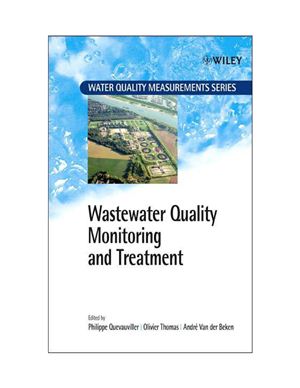Wiley. 2006. 397 p.
Wastewater monitoring procedures are subject to many drawbacks due to the difficulties in accurately and frequently measuring the necessary variables, which essentially rely on ‘classical’ monitoring approaches involving sampling, storage and laboratory analysis. The only way to make progress in wastewater treatment, and hence to comply with related regulations, is to ensure that the plants are able to work with complete reliability. This implies that reliable monitoring of the wastewater quality and quantity and of the treatment efficiency should be performed for the characterisation of raw and treated wastewaters and for the control of the plant itself.
Contents.
Wastewater Regulation.
Sampling Assistance.
Standard Methodologies.
Alteative Methods.
Biosensors and Biological Monitoring for Assessing Water Quality.
Reference Materials.
Sewers (Characterization and Evolution of Sewage).
Sewer Flow Measurement.
Monitoring in Rural Areas.
Elements of Modelling and Control of Urban Wastewater Treatment Systems.
Treatability Evaluation.
Nutrient Control.
State Estimation for Wastewater Treatment Processes.
Industrial Wastewater Quality Monitoring.
Quality Survey of Wastewater Discharges.
Monitoring for Water Quality Modelling.
Discharges in Sensitive Receiving Waters.
Water Reuse.
Collecting and Merging Data from Widespread and Disparate Sources.
Training.
Wastewater monitoring procedures are subject to many drawbacks due to the difficulties in accurately and frequently measuring the necessary variables, which essentially rely on ‘classical’ monitoring approaches involving sampling, storage and laboratory analysis. The only way to make progress in wastewater treatment, and hence to comply with related regulations, is to ensure that the plants are able to work with complete reliability. This implies that reliable monitoring of the wastewater quality and quantity and of the treatment efficiency should be performed for the characterisation of raw and treated wastewaters and for the control of the plant itself.
Contents.
Wastewater Regulation.
Sampling Assistance.
Standard Methodologies.
Alteative Methods.
Biosensors and Biological Monitoring for Assessing Water Quality.
Reference Materials.
Sewers (Characterization and Evolution of Sewage).
Sewer Flow Measurement.
Monitoring in Rural Areas.
Elements of Modelling and Control of Urban Wastewater Treatment Systems.
Treatability Evaluation.
Nutrient Control.
State Estimation for Wastewater Treatment Processes.
Industrial Wastewater Quality Monitoring.
Quality Survey of Wastewater Discharges.
Monitoring for Water Quality Modelling.
Discharges in Sensitive Receiving Waters.
Water Reuse.
Collecting and Merging Data from Widespread and Disparate Sources.
Training.

